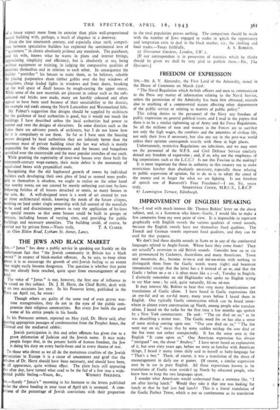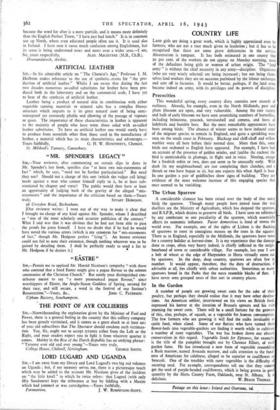IMPROVEMENT OF ENGLISH SPEAKING
SIR,—I read with much interest Mr. Thomas Robins' letter on the above subject, and, as a Scotsman who knows Gaelic, I would like to mike a few comments from my own point of view. It is impossible to represent graphically with English vowels the various qualities of vowel sounds, because the English vowels have not themselves fixed qualities. The French and German vowels represent fixed qualities, and they can be used for that purpose.
We don't find those double sounds in Scots or in any of the continental languages related to Anglo-Saxon. Where have they come from? They are actually'a reversion to old British sounds. Consider how ou or ow are pronounced by Cockneys, Australians and many Americans. Town and mountain, &c., become to-ou-n and me-ou-ntain with nothing to distinguish them from the Gaelic words teann (tight) and beanntan (mountains) except that the latter has a b instead of an m, and that the Gaelic r before an e or i is often more like a j—cf., Tuesday in English. I distinctly remember an old Highlander who spoke no English trying to say blue nose ; he said, quite naturally, bli-ou ne-ous.
It may interest Mr. Robins to hear that very many Americanisms are translations of Gaelic idiom. I have heard in Gaelic expressions like an eye-ful and an ear-ful many, many years before I heard them in English. One typically Gaelic construction which can be heard some- where in almost every conversation up North, among people who translate idiom, I heard on the radio for the first time a few months ago spoken by a New York commentator. He said: " The car died on us," as he was describing a motor tour. The Gaelic word for on has also a sense of some mishap coming upon one. " Our cow died on us," " The fire went out on us," mean that by some sudden mishap the cow died or the fire went out rather unexpectedly. It has the sense seen in the English " It came upon us." One American expression has always " intrigued " me, the shout " Attaboy." I have never heard an explanation of it, but over sixty years ago, before we were so familiar with American things, I heard it many times daily said to 'myself as baby-language for " That's a boy." There, of course, it was a translation of the shout of encouragement in daily use at games. Of course, a similar expression may be in use in pure English. All those expressions known to be translations of Gaelic were avoide 1 up North by educated people, who knew how to keep the two languages apart.
I wonder what Americans would understand from a sentence like, " I am after having lunch." Would they take it that one was looking for lunch or that he had just had lunch? This is a literal translation of the Gaelic Perfect Tense, which is not so cumbersome as its translation because the word for after is a mere particle, and it means more definitely than the English Perfect Tense, " I have just had lunch." It is in common use up North, where even educated people often use it. It is used also in Ireland. I have seen it cause much confusion among Englishmen, but its sense is being understood more and more over a wider area.—I am,



























 Previous page
Previous page